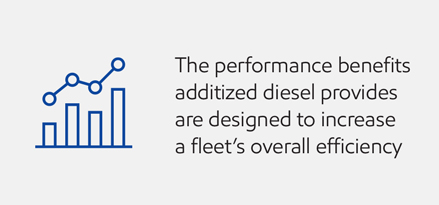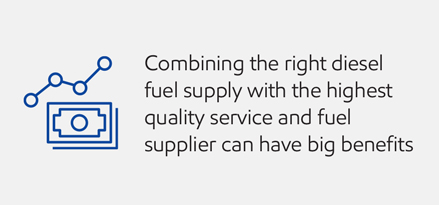According to the Fleet Management Market: Global Opportunity Analysis and Industry Forecast (2021 - 2030) report, fleets in the region are set to grow with companies adding more vehicles to meet the demands of production, sales and supply.
An increase in fleet size is likely to contribute to a surge in costs and maintenance efforts with fleet managers expected to manage the responsibility of finding operational efficiencies. However, the role of a fleet manager in Asia Pacific is usually procurement-driven and function-steered, with managers carrying out tactical tasks such as answering drivers’ queries and arranging service appointments.
As they transition from a procurement function to strategic fleet management, fleet managers should look for parties they can collaborate with to meet the evolving needs of their role – one of them is the fuel supplier. Many fleets have realized the potential benefits of working closely with their fuel supplier to ensure they are using the right product for their fleet.
Beginning a dialogue to better understand the products and services suppliers provide, and what will best meet your fleet’s needs, can be vital in determining a fleet’s success.
Based on our experience, we have pinpointed six important questions that smart fleet managers should discuss with their current or potential fuel supplier, and have also provided insights into these important areas:

How is my product handled, stored and transported?
Fuel can be easily contaminated. For example, a common on-site storage issue is the presence of water in the tanks, which can lead to bacteria growth in the fuel. In turn, the bacterial growth can result in filter plugging issues that can translate to added downtime and decreased fleet efficiency.
Having a conversation with your supplier about their regulatory awareness, safety focus and qualifications for the carriers who store and handle their products can lead to peace of mind and help build trust.
Should I use an additized diesel? Will it cost more?
While an additized diesel product will cost more than a base diesel fuel at the onset, it is a superior product that is designed to ultimately lower fuel consumption and emissions, and improve both power and responsiveness, among other benefits.
While the product itself is more expensive, the performance benefits additized diesel provides are designed to increase a fleet’s overall efficiency. This can, in turn, help the fleet meet sustainability goals and help reduce the long-term total cost of ownership of each vehicle.
Does your product provide performance benefits?
An additized diesel will help maintain optimal performance in the engine’s fuel system. This translates to fuel savings, better power, and cleaner combustion when compared to trucks and buses running unadditized diesel fuel. Protecting the fuel system with detergent can also help increase a fleet’s overall efficiency.
Oftentimes, fleets are not too concerned about the diesel they use, in large part because their vehicles’ engines are under warranty. However, even though the maintenance may be covered, taking the truck and bus off the road remains costly.
In fact, more advanced, additized diesel offerings can also work to provide benefits to those circumstances that are not covered under warranty, such as premature fuel filter plugging.
Over time, realizing these benefits from a high-performing, additized diesel can lower the total cost of ownership and upkeep across a fleet. Reducing the number of trips to the workshop can provide more efficiency across operations and a stronger return on investment.
How are additives administered into your products?
While a base diesel product will come ready to use, if a fleet wants to use a more advanced product – such as an additized diesel – that fuel offering may vary in terms of how the additives are mixed with the fuel. The preferred way is to receive the additive injected into the diesel by your supplier. This ensures the product is properly mixed to meet performance expectations in your engines. While there are alternative ways of putting additives into fuel, care should be taken to ensure the fuel is homogenous and properly dosed. In particular, hand dosing is not recommended.
Inadequate mixing can result in filter plugging from undissolved additives; under-dosing is likely to result in underperformance versus claims, while overdosing could potentially lead to operational issues. It’s important to ask for proof that the additive and fuel are homogenous and the additive concentration is within specification.
Should I be looking at alternative fuel options?
While alternative fuels have become more popular in recent years, we do not expect diesel use to dwindle anytime soon. In fact, we expect the opposite. According to ExxonMobil’s 2021 Outlook for Energy, oil (including diesel) continues to play a leading role in the world's energy mix . As economic activity expands, commercial transportation is expected to grow, led by Asia Pacific. With majority of the growth coming from heavy-duty trucking as a result of goods movement, diesel use will continue to rise globally.
As diesel formulations continue to evolve, advanced diesel products – such as additized diesel – will continue to offer impressive fuel economy and maintenance benefits while reducing emissions.

How do you test to ensure your fuel meets product specifications?
It is essential for the wellbeing of your fleet that the diesel fuel meets all relevant product specifications and all diesel fuel suppliers should be well aware that this is the case.
That said, a leading fuel supplier will have a robust product testing methodology in place, reinforcing their commitment to product integrity. If the fuel supplier’s testing parameters go beyond what is required, even better - that may indicate the supplier is dedicated to providing you with quality diesel fuel that goes above and beyond industry specifications, adding an extra level of protection.
Why it matters
Esso recommends combining the right diesel fuel supply with the highest quality service and fuel supplier. This can have big benefits for fleets in today’s transportation landscape, which include improving a fleet’s overall efficiency, uptime and performance, helping fleet managers realize business benefits in the long term.

